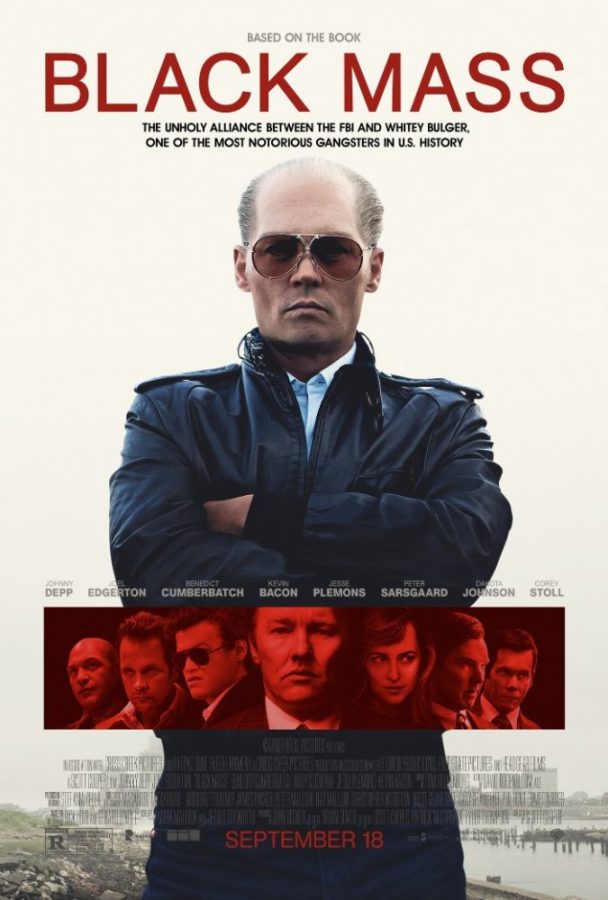A memorably menacing performance from Johnny Depp as notorious, real-life crime lord James “Whitey” Bulger is far and away the best part of “Black Mass,” with the surrounding narrative being underwhelming.
Bulger leads the Winterhill Gang, a group of Irish-Americans who vie for control of criminal activity in South Boston. Their competition is the Italian mob run by the Angiulo family.
Bulger isn’t the only one from ‘Southie’ who’s gone and made a name for himself. His younger brother, William “Billy” Bulger (Benedict Cumberbatch), is a Massachusetts senator, and John Connoly (Joel Edgerton), who grew up a few doors down from the Bulger residence, has risen through the ranks of the FBI. The ties run deep and unyielding in South Boston.
This unholy trinity will eventually lead to their downfalls, but first it will lead to South Boston being infected by Bulger. As a high-ranking politician, Billy doesn’t associate himself with his brother’s life, and his hands-off attitude essentially serves as passive acquiescence. Connoly, on the other hand, strikes a deal with the devil himself, more or less giving Bulger carte blanche to do whatever he wants.
At the Bureau, Connoly feels pressure to bring down the Angiulo mafia. He strikes a deal with Bulger, his childhood neighbor and fellow Southie, to become an FBI informant. Bulger’s not an educated man, occasionally speaking like someone who didn’t make it out of high school. He’s shrewd enough, though, to realize that becoming an informant not only brings him into the FBI’s fold, but that they’ll also go after his enemies.
Bulger serves as a constant force of nature in this world, with his physical appearance making him into a sort of morbid Grim Reaper. His colorless hair is slicked back so tightly that it clings to his skull. His eyes, though, are his most unnerving trait. They are an opaque gray-blue.
Initially, his family gives him a smidgen of humanity.
There’s a great scene where Bulger, his wife Lindsey (Dakota Johnson) and son Douglas (Luke Ryan) are sitting around the kitchen table, having breakfast like the perfect American family. When his son tells him that he got in trouble at school for punching another boy, Bulger says that his son’s mistake was not that he punched a kid, but that he punched a kid where people could see.
There are many of these innocuous moments that turn on a dime with Bulger’s threatening presence. In a scene where a woman says she’s not feeling well, Bulger offers to take her temperature, knowing that she’s faking ill. He puts his hands all over her forehead, then her face and then moves down to her neck, “feeling her glands” with a grip that’s a few muscle tenses shy of choking her. It makes your skin crawl.
Bulger doesn’t have much of a character arc, though. He’s evil to begin with and stays evil through and through. Bulger’s right-hand enforcer describes him as “strictly criminal.”
The progression in narrative comes from Connoly, who goes deeper and deeper down the rabbit hole of protecting Bulger’s status as an informant as his fellow co-workers at the FBI get more and more suspicious of what exactly Bulger is providing them.
The problem is that this isn’t the part of the movie that everyone’s come to see. We want to see Depp chew up the screen.
The second act also feels inert. Bulger’s power and influence expand, but it lacks the perspective of scope of, say, “The Godfather: Part II.” Even when Bulger gets involved in embezzling with jai alai in exotic Miami, it just doesn’t feel any different than what he’s been doing in Boston.
A lot of Bulger’s crimes are relayed to the audience through once-removed dialogue. Toward the end of the film, a character says that Bulger introduced drugs to nearly every grade-school-aged kid in the city. The problem is, we haven’t seen Bulger dealing with drugs, nor have we seen the effect that his drugs have had.
The film will zoom in on Bulger’s story when he shoots or strangles someone, but it doesn’t give an accurate sense of the larger scale of his actions.
Even with Depp’s performance as Whitey Bulger, “Black Mass” lacks character, and isn’t memorable.
C+
Follow Alex Guyton on Twitter.









